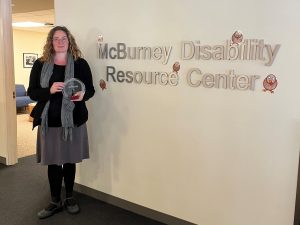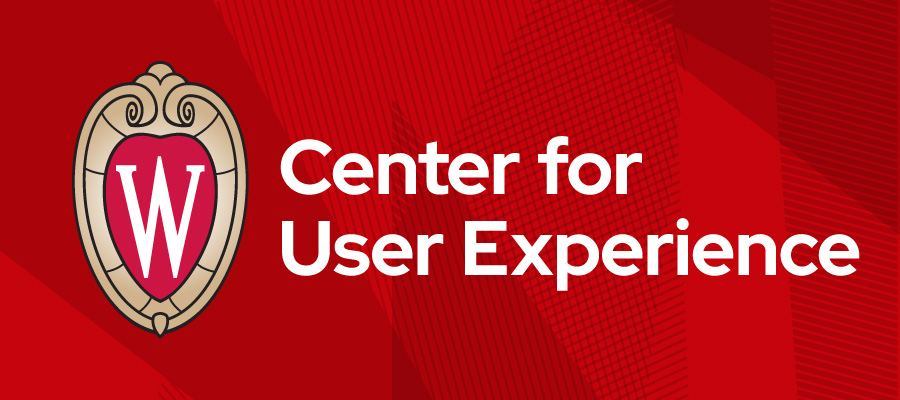We caught up with Maria Dahman from the Center for User Experience, a recipient of a Forward in Access Award from the McBurney Disability Resource Center. A user experience architect, researcher and designer, Dahman was lauded by the McBurney Center for being a “vital partner and collaborator” to improve the accessibility of eText technology, helping to ensure we’re meeting students’ needs.
Meet the winners: Forward in Access Awards
We asked Dahman a few questions about her work, her passions and what’s next for the Center for User Experience:

Q. What role does the Center for User Experience play on our campus?
A. We partner with the university community to create more accessible, usable and inclusive digital spaces for students, faculty and staff. We are lucky to partner with a lot of groups, though we always wish we could work with more! We are trying to find ways to expand our capacity. One way is through creating and supporting a network of liaisons from different units who are interested in learning more about digital accessibility.
Q. What got you started professionally in user experience and accessibility?
A. A winding path got me into UX (user experience), so I’ll focus on my start in accessibility. My advisor in graduate school, Dr. Cynthia Putnam, got me interested in digital accessibility. Before I took her classes I didn’t understand the connection between usability and accessibility—namely, that if you have an inaccessible interface, it is by definition not usable. I’m not sure if I even knew that people who are blind or who have very low vision used computers before her class. She taught about the diversity of disabilities, and how we might consider a more inclusive user experience—how to consider autism, types of color-blindness, and ADHD (attention-deficit/hyperactivity disorder) in our designs, for example. I ended up working with her a lot, and we published a paper on how accessibility is taught in university-level computer science courses.
Q. What energizes you in your work?
A. I love the fact that my work is always different. In every personality-style or strengths test I’ve taken, my highest scores are always around learning, picking up new things and spending time thinking about them. I get to do that a lot in my job and I’m really grateful to be able to do so.
Q. You collaborate with a lot of people across our university community. Is there someone who’s left a particular impression on you?
A. Many people have left an impression on me! Though I’ll mention one who is emeritus and whom I met before I moved here. As a part of a graduate school symposium, I watched a presentation that Dr. Gregg Vanderheiden gave about his work at the Trace Research & Development Center here at UW–Madison. My advisor was able to interview him for our paper, and I remember a vivid description he gave of how we disable people through poor design. It was a thought experiment about a large portion of humans evolving to grow wings—and how, because most people were now winged, people stopped building staircases. Of course, those of us who rely on walking to get to different levels in buildings have now become disabled. We are disabled by exclusive design.
Q. What’s next for the Center for User Experience? Or is there a big project on the horizon you’re particularly excited about?
A. We just finished recruiting a new director for our Center, who will start near the end of April. His name is Will Burns, and he’ll be coming to us from the University of Michigan, where he led a similar team. That is very exciting for our team! Currently, our team is keeping busy with the new digital accessibility policy, which our team will help support by training liaisons from across campus and by evaluating digital interfaces for accessibility.
Q. What ignites your spark outside of work?
A. I spend a lot of time with my spouse and 2 children, and I very much enjoy being with them. Acting, writing and directing are personal passions that I try to include the kids in (and lately some coworkers!). And I find astronomy very nourishing. My older son in particular is very tolerant when I drag him out in the middle of the night to scope out a comet or an unusual planetary alignment.
